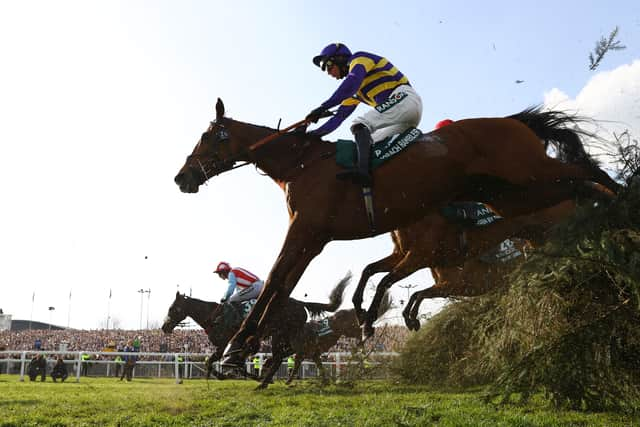How many horses died at the Grand National? Animal deaths confirmed at Aintree Racecourse
and live on Freeview channel 276
Animal rights campaigners have called for jump racing to be banned and “much more stringent” safety measures in the sport after three horses died at the 175th annual Grand National Festival.
The third fatality, Hill Sixteen, is said to have suffered a broken neck at the first fence at the Aintree Racecourse in Liverpool before being put down. This followed the deaths of Dark Raven and Envoye Special earlier on Saturday (15 April) and on Thursday (13 April) respectively.
Advertisement
Hide AdAdvertisement
Hide AdAnimal Aid called for jump racing to be banned in the wake of the deaths.
The campaign group’s horse racing consultant Dene Stansall said: “Jump racing must be banned to prevent the brutal horrors seen today at Aintree and this week, from happening again. Innocent race horses’ lives taken from them in the name of entertainment and gambling. Aintree, the worst of all racecourses, is a disgrace and the Jockey Club and British racing should hang their heads in utter shame at what we have seen over the past three days.”
How many horses died at the Grand National in 2023?
Hill Sixteen died after suffering a broken neck during the steeplechase on Saturday. It followed the deaths of two other horses during the festival which can from 13 April to 15 April.


How many horses have died since the year 2000?
The League Against Cruel Sports said the death toll at the Aintree Festival was now 62 horses since 2000 – with 16 killed in the Grand National, including two last year. The League called for “much more stringent” safety measures in horse racing, including banning the use of the whip.
Advertisement
Hide AdAdvertisement
Hide AdEmma Judd, head of campaigns and communications at the League, said: “It cannot be more apparent that it is time for change and for the introduction of tighter safety measures in the Grand National, at the Aintree racecourse and at racecourses across the UK. One death is too many. Animal welfare needs to be put before gambling profits and entertainment, and steps need to be taken to end this carnage which is occurring year after year.
“A new independent regulatory body is required which has horse welfare as its number one priority. The use of the whip, which pushes horses beyond what they can safely do, should be banned.”
Campaigners say Grand National has ‘high risk factor’
Peta UK described the Grand National race as “one of the longest and most hazardous in the world”, saying its “high risk factor” is “what makes it famous”. The organisation called for the public to urge sponsors to withdraw financial support for the event.
“Almost every year, horses are killed during the three-day festival, sustaining horrific and often fatal injuries at notorious fences such as the Chair, Becher’s Brook, and the Canal Turn,” Peta UK said. “Every time horses are forced to jump over these excessively high obstacles, it puts tremendous pressure on their slender front legs and they risk broken legs, necks, and backs.
Advertisement
Hide AdAdvertisement
Hide Ad“In some cases, drugs – both legal and illegal – have been administered by trainers and even veterinarians to mask the pain of horses who should have been recuperating so that they could instead be forced to run with injuries, making them worse. Even those who make it off the track alive are likely to suffer. Thousands of horses – including ‘spent’ Thoroughbreds and those who don’t ‘make the grade’ – are discarded like used betting slips every year.
“They’re abandoned, neglected, or sold for slaughter.”
Campaign group Viva! tweeted that the Grand National is “infamous for killing horses”. It urged people not to support the annual race.
“It is a cruel, out-dated sport that needs to end,” the group added.
How has the horse racing industry responded?
Dickon White, who runs Aintree Racecourse as North-West regional director for Jockey Club Racecourses, said: “Hill Sixteen was immediately attended by expert veterinary professionals during the Grand National, but sadly sustained a fatal injury. Our heartfelt condolences are with his connections.”
Advertisement
Hide AdAdvertisement
Hide AdHe added: “While racing in the third race, Dark Raven was immediately attended by our expert veterinary professionals. After assessment, sadly they concluded the necessary course of action for the horse’s welfare was to put him to sleep. Our sincere sympathies are with his connections.”
Julie Harrington, chief executive of the British Horseracing Authority (BHA), said: “Our thoughts are with everyone connected to the horses who suffered fatal injuries this week. British racing works tirelessly to improve the sport’s safety record and reduce avoidable risk. Every incident is reviewed by the BHA alongside the race course and other bodies.
“As a sport we have for years shown great determination and commitment to improve welfare standards by taking measured scientific, evidence-based, regulatory and education-based steps.”
Comment Guidelines
National World encourages reader discussion on our stories. User feedback, insights and back-and-forth exchanges add a rich layer of context to reporting. Please review our Community Guidelines before commenting.